六层5000平米钢框架结构南京市某高校办公楼设计(含建筑图结构图)
无需注册登录,支付后按照提示操作即可获取该资料.
六层5000平米钢框架南京市某高校办公楼设计(含建筑图结构图)(任务书,开题报告,外文翻译,计算书23000字,CAD天正建筑图结构图23张)
摘 要
本设计是为实际工程应用课题,对南京市某高校办公楼进行钢结构建筑、结构的设计。本工程为六层钢框架办公楼,横向2跨(9m×6m)、纵向9跨(5.0m×4+8.0m+5.0×4m),平面轴线尺寸为15m×48m,层高分别为:底层3.5m,二至六层3.3m,建筑高度为20m,总建筑面积约5000m2。建筑结构安全等级为二级,设计使用年限为50年,地基基础设计等级为丙级,抗震设防烈度为7度。
设计内容包括建筑设计与结构设计两部分。建筑设计包括:底层、基本层、顶层、总平面图。结构设计包括:荷载计算以及一榀框架的内力分析(恒载、活载、地震作用、风荷载),梁柱截面设计、节点设计、楼面板设计、楼梯设计、基础设计。
本设计主要进行了结构方案中横向框架第7轴抗震设计。在确定框架布局之后,先进行了层间荷载代表值的计算,然后按底部剪力法计算水平地震荷载作用下大小,进而求出在水平荷载作用下的结构内力(弯矩、剪力、轴力)。接着计算竖向荷载(恒载及活荷载)作用下的结构内力。是找出最不利的一组或几组内力组合。 选取最安全的结果计算配筋并绘图。此外还进行了结构方案中的室内楼梯的设计。完成了平台板,梯段板,平台梁等构件的内力和配筋计算及施工图绘制。对楼板进行了配筋计算,本设计采用独立基础。
整个结构在设计过程中,严格遵循相关的专业规范的要求,参考相关资料和有关最新的国家标准规范,对设计的各个环节进行综合全面的科学性考虑。总之,适用、安全、经济、使用方便是本设计的原则。
关键词:钢结构 建筑设计 内力计算 基础设计
A design institute office building in Jiangsu Province, Nanjing City
Abstract
The design is the comprehensive use of the professional knowledge, Yangzhou City, Jiangsu Province, a design institute office building steel structure, structure design.The project is a seven-story steel frame (including the basement of a layer) office building, total length 48m, width 16m, layer height: basement 3.6m, the bottom 3.5m, two to six 3.3m, building height of 20m, The total construction area of about 5000m2. The structural safety level is Grade 2, the design life is 50 years, the foundation design level is Grade C, and the seismic fortification intensity is 7 degrees.
The design includes three parts: architectural design, structural system selection and structural design. The structural system scheme is mainly determined by comparing the seismic performance of different schemes. The structural design includes: vertical design of the floor and a vertical force of the frame, the role of the earthquake and the wind load, and with the PKPM software, the component cross-section design, node design and construction drawing.
The design of the main structure of the program horizontal framework 5-axis seismic design. In determining the distribution framework, the first layer of representative value of the load, then at the bottom of shear horizontal seismic load calculation under size, and then calculated the level of load under the Internal Forces (bending moment, shear and axial force). Then calculate vertical load (constant load and live load) under the Internal Forces. Identify the most disadvantaged group or an internal force several combinations. Select the best safety results of the reinforcement and Mapping. In addition, the structure of the program indoor staircase design. Completion of the platform boards, boards of the ladder, platform beam component and the reinforcement of internal forces calculation and construction mapping. On the floor reinforcement calculation, This design uses an independent foundation.
The whole structure of the design process, in strict compliance with the relevant professional standard, reference to relevant information and the latest national standards and specifications, and design of the various components of a comprehensive scientific considerations. In short, application, security, economic and user-friendly design is the principle.
Key Words:Steel structure; Architectural design; Internal force calculation; Basic design
1.1 工程概况
本工程为南京市某高校办公楼,主体为6层钢框架结构,首层高3.5m,其余层高3.3m,平面轴线尺寸为15m×48m,总建筑面积约5000m2
1.2 建筑结构等级指标及设计年限
1.建筑结构安全等级:二级
2.结构设计使用年限:50年
3.地基基础设计等级:丙级
1.3 设计相关参数
1.基本风压:0.4kN/m2
2.基本雪压:0.65kN/m2
3.场地类别:丙级
4.地面粗糙类型:C类
5.抗震设防烈度:7度
6.设计基本地震加速度:0.10g
7.设计地震分组:第一组
1.4 工程地质资料
据勘察院提供的资料,地表下土层分布自上而下为:
①层素填土:深灰色,粉质粘土质,松散状,上部含植物根茎,为新近堆积物,厚度:1.00~2.60m,平均1.78m。
②层淤泥质粉质粘土:深灰色~灰绿色,流塑,无摇振反应,稍有光泽,低干强度及韧性,局部夹青灰色稍密状粉土薄层,厚度:3.10~10.10m,平均5.85m;。
③层粉质粘土:灰色~灰褐色,软-可塑,无摇振反应,稍有光泽,中高干强度及韧性厚度:3.20~7.10m,平均4.85m。
④层粉质粘土夹粉土:粉质粘土棕黄色~褐黄色,软—可塑,无摇振反应,稍有光泽,中高干强度及韧性。该层以粉质粘土为主,局部为粉土,厚度:1.80~10.70m,平均5.00m;。
⑤层粉砂:青灰色,中密,饱和,主要矿物成分石英、长石、云母等。局部夹薄层可塑状粉质粘土簿层。沿线场区普遍分布,厚度:3.30~6.10m,平均
4.99m。
拟建场地地下水位为1.5米,地下水对混凝土无侵蚀性。
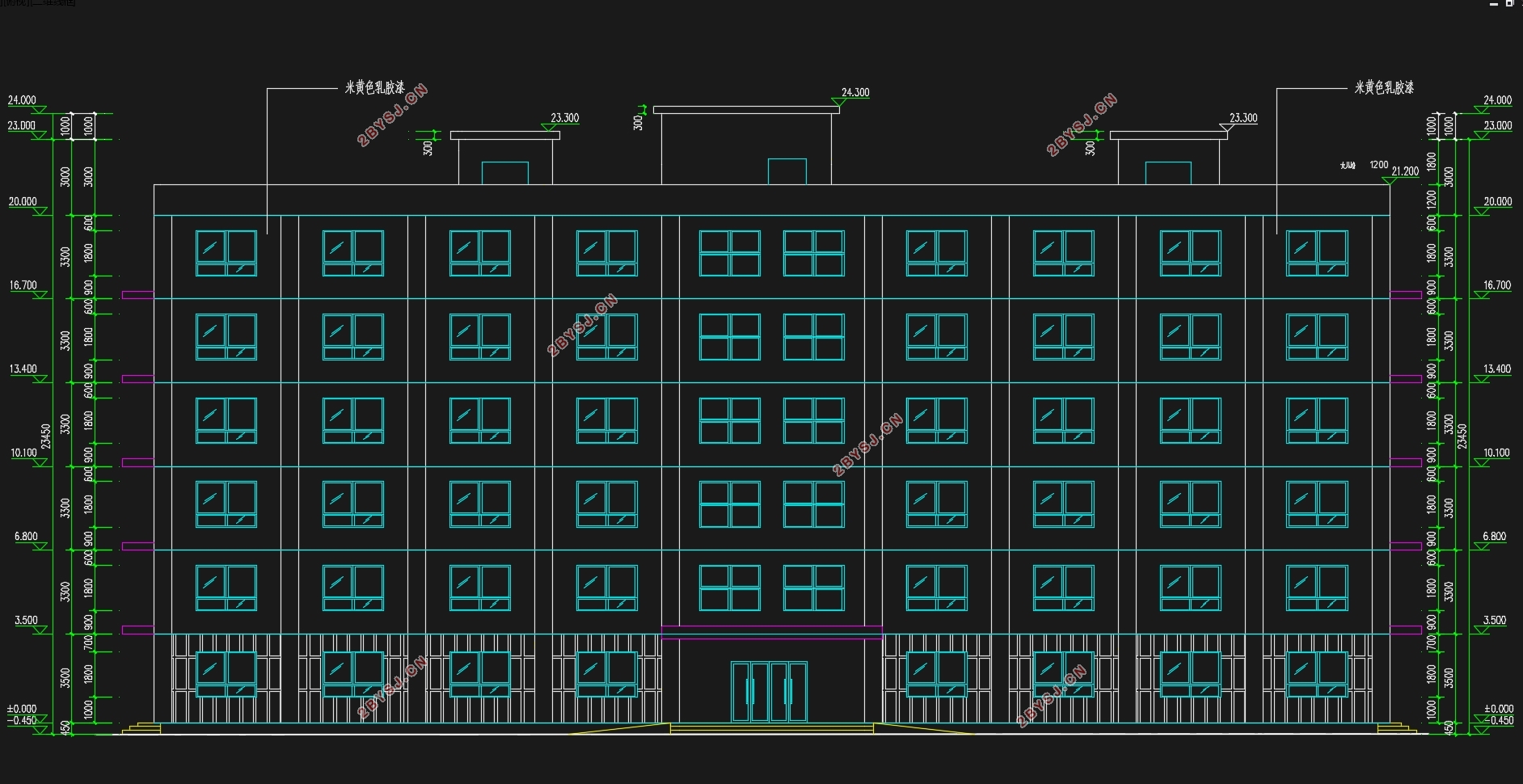
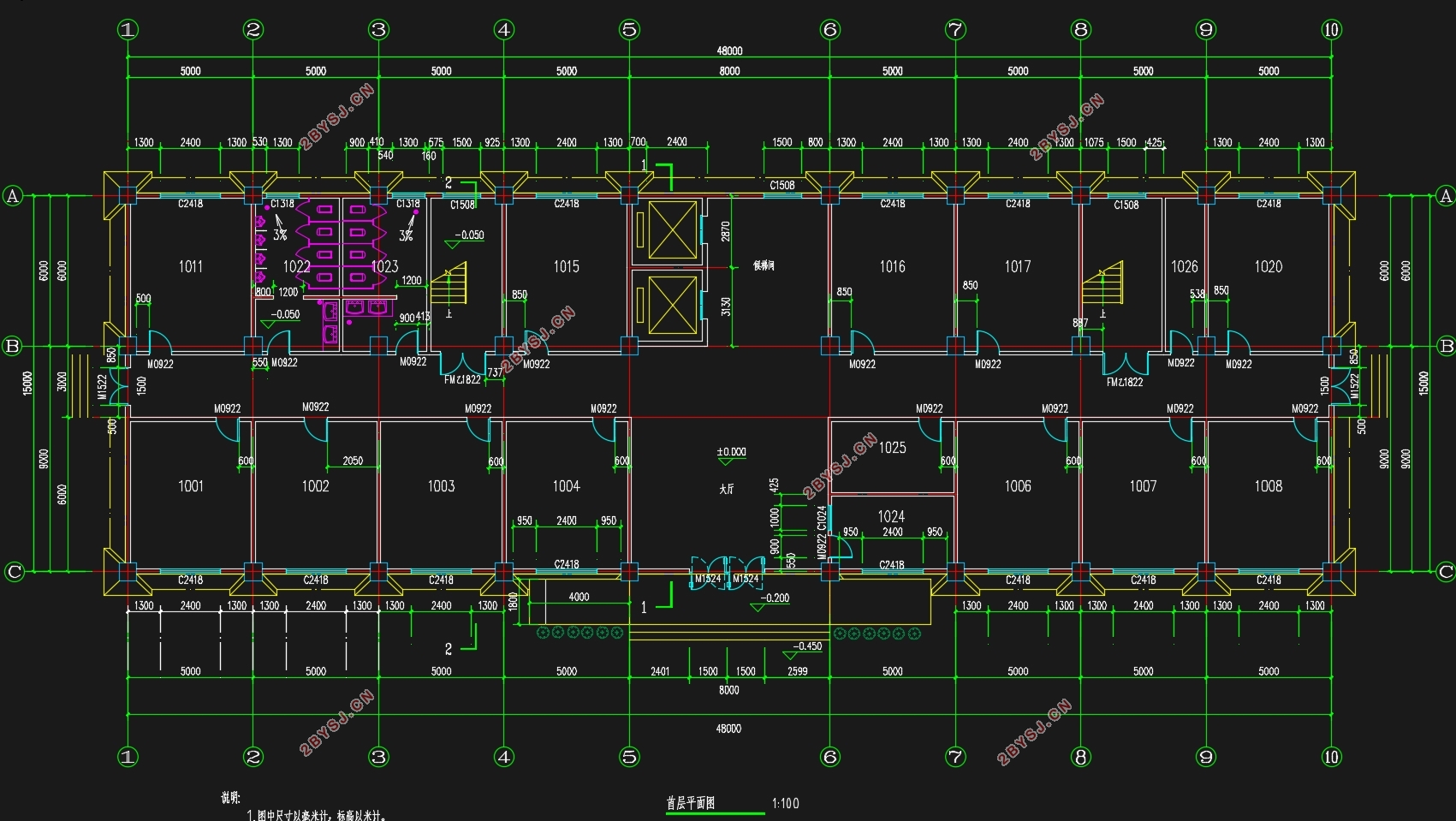
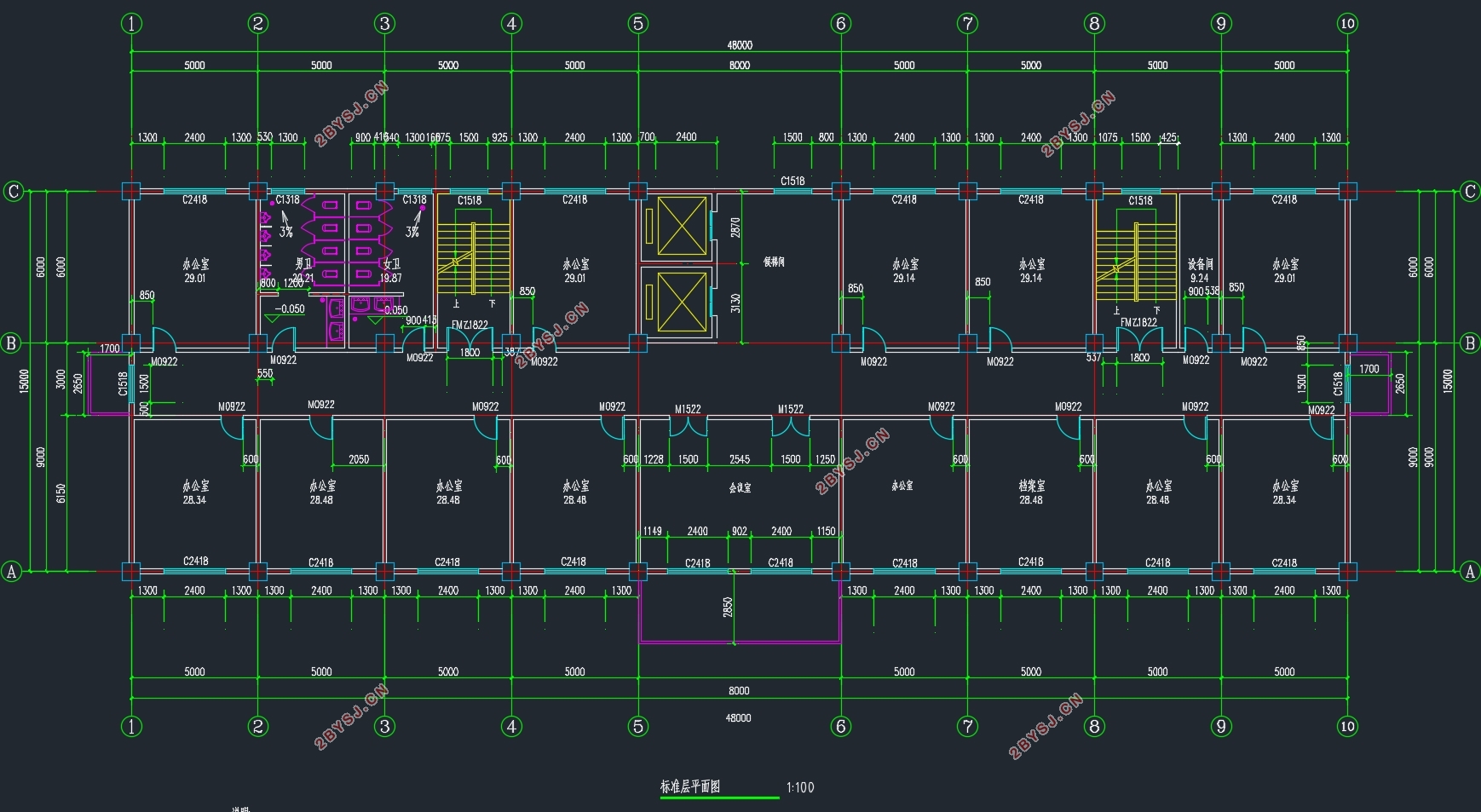
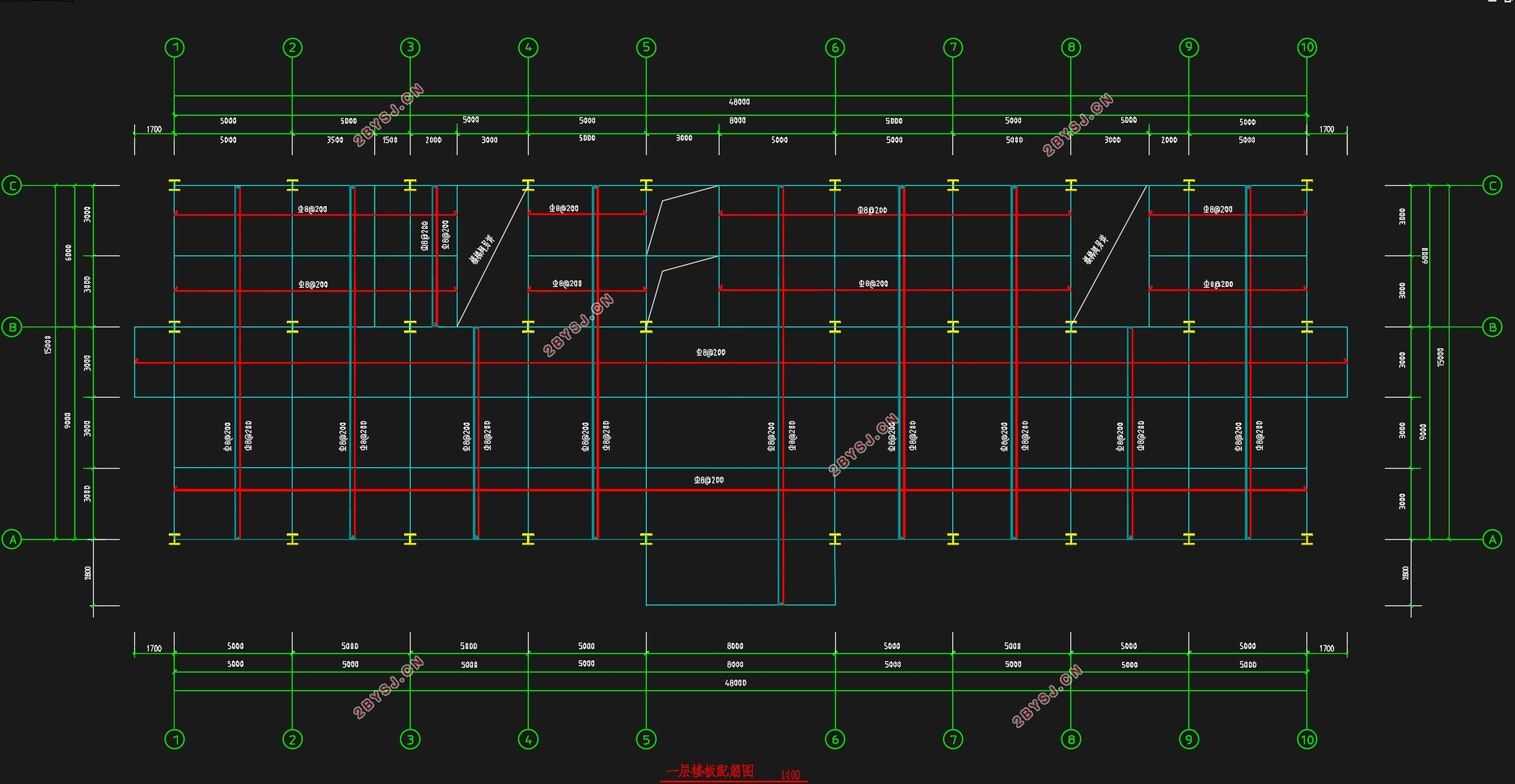
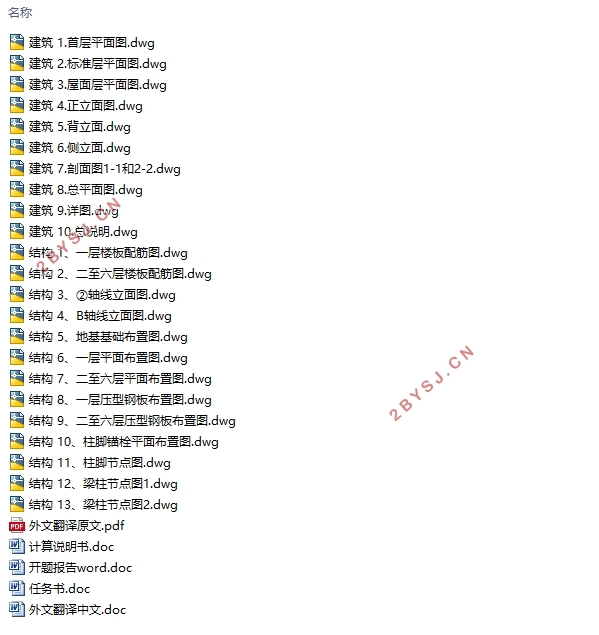
目 录
摘 要 I
ABSTRACT II
第一章 设计概况 1
1.1 工程概况 1
1.2 建筑结构等级指标及设计年限 1
1.3 设计相关参数 1
1.4 工程地质资料 .1
1.5 本工程设计过程中所遵循的标准、规范 2
1.6 设计内容 2
1.6.1 建筑设计 2
1.6.2 结构设计 2
第二章 建筑设计 4
2.1 平面设计 4
2.2 立面设计 4
2.3 剖面设计 4
2.4 建筑防火设计 4
2.4.1 消防车道及防火间距 4
2.4.2 安全疏散 4
第三章 结构选型与结构布置 5
3.1 结构选型 5
3.2 结构布置 5
3.2.1 平面布置 5
3.2.2 竖向布置 5
3.2.3 楼盖布置 5
3.2.4 基础形式 5
3.3 材料的选用 6
3.4 初估构件截面尺寸 6
3.4.1 框架主梁、次梁截面初估及验算 7
3.4.2 框架柱初估及验算 9
3.4.3 组合楼盖初选 11
3.4.4 梁柱的计算跨(高)度 11
3.5 框架计算单元及计算简图 12
第四章 荷载标准值计算 14
4.1 屋面及楼面的永久荷载标准值计算 14
4.1.1 屋面荷载 14
4.1.2 办公楼面荷载(包括走廊、楼梯等) 14
4.1.3 卫生间楼面荷载 14
4.2 屋面及楼面的可变荷载标准值计算 15
4.2.1 上人屋面均布活荷载标准值 15
4.2.2 楼面活荷载标准值 15
4.2.3 雪荷载标准值 15
4.3 梁、柱、墙重力荷载计算 15
4.4 竖向荷载计算 16
4.4.1 恒载计算 16
4.4.2 活载计算 17
4.5 风荷载计算 18
4.6 地震荷载计算 20
4.6.1 重力荷载代表值计算 21
4.6.2 梁柱线刚度计算 22
4.6.3 柱的抗侧移刚度D值计算 23
4.6.4 框架自震周期的计算 24
4.6.5 水平地震作用计算及楼层地震剪力计算 25
4.6.6 水平地震作用下位移验算 27
第五章 内力分析 28
5.1 恒荷载标准值作用下的内力计算 28
5.1.1 框架梁线刚度及弯矩分配系数 28
5.1.2 恒载作用下梁固端弯矩的计算 28
5.1.3 框架弯矩、剪力、轴力计算 29
5.2 水平地震作用下的内力计算 34
5.2.1 反弯点高度计算 34
5.2.2 水平地震作用下横向框架的内力计算 36
5.3 左侧风荷载作用下的内力计算 42
5.4 活荷载作用下的内力计算 46
5.4.1 活荷载作用下梁固端弯矩的计算 46
5.4.2 框架弯矩、剪力、轴力计算 47
第六章 横向框架内力组合 52
6.1 框架梁内力组合 52
6.1.1 框架梁基本内力组合 52
6.1.2 框架梁地震内力组合 54
6.2 框架柱内力组合 56
6.2.1 框架柱基本内力组合 56
6.2.2 框架柱地震内力组合 59
第七章 构件截面验算 63
7.1 框架柱截面验算 63
7.1.1 中柱截面特性 63
7.1.2 中柱截面验算 63
7.2 框架梁截面验算 51
7.2.1 框架梁截面特性 69
7.2.2 框架梁截面特性 69
7.3 节点抗震验算 71
7.3.1 强柱弱梁验算 71
7.3.2 节点域抗剪承载力验算 72
7.3.3 节点域稳定性验算 73
第八章 梁柱节点设计 74
8.1 连接设计 74
8.1.1 连接形式 74
8.1.2 尺寸确定 74
8.1.3 内力控制 75
8.2 连接螺栓计算 75
8.3 连接极限承载力验算 79
8.4 柱腹板局部承压和稳定性验算 80
8.5 柱翼缘板厚度验算 81
8.6 主次梁连接节点设计 82
8.7 柱脚设计 84
第九章 楼面结构设计 88
9.1 压型钢板的选用 88
9.2 楼板的配筋 92
第十章 楼梯设计 93
10.1 设计资料 93
10.2 踏步板计算 94
10.2.1 踏步板荷载 94
10.2.2 内力计算 94
10.3 楼梯斜梁计算 95
10.3.1 荷载计算 95
10.3.2 内力计算 96
10.3.3 截面验算 96
10.4 平台梁设计 96
10.4.1 平台梁荷载计算 96
10.4.2 内力计算及截面验算 97
10.5 平台板设计 98
10.5.1 平台荷载计算 98
10.5.2 内力计算及截面验算 98
第十一章 基础设计 99
11.1 设计资料 99
11.2 确定单桩竖向承载力标准值 99
11.3 基桩竖向承载力设计值及桩数计算 99
11.4 桩基的验算 100
11.5 平台板设计 100
11.5.1 承台内力计算 101
11.5.2 柱对承台的冲切 101
11.5.3 桩对承台的冲切 101
11.5.4 承台受剪承载力的验算 102
第十二章 电算结果 104
参考文献 105
致 谢 106
